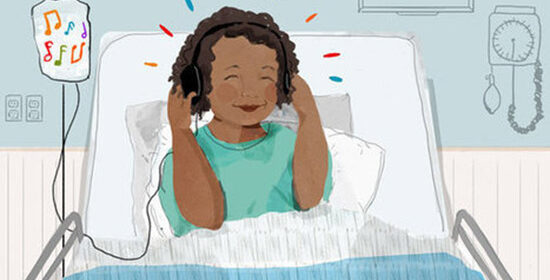Music in the Hospital

Deana Truong –
Music: The Difference between the Ambulance and the Hospital
Playing music is one of the luxuries afforded in an ambulance. Though the method of conducting medicine in the hospital precludes the playing of music in certain areas, playing music is something that many EMTs and Paramedics agree plays a role in affecting a patient’s experience.
And this is a key point of departure that separates how treatment is performed in a hospital setting from the prehospital setting.
In an ambulance, the driver is able to play music, either for their own pleasure or to the delight of the patient. And occasionally, there are patients that benefit greatly from hearing music, particularly calming music.
One night, my partner and I had a patient who presented with anxiety, secondary to high blood pressure, and was actively trying to breathe at a normal rate. He had a preexisting history of anxiety but was non-compliant with any medications. For his condition, it would have been inappropriate to treat him with any medications – besides oxygen – so oxygen was administered and we also played lofi music, loud.
After transport, he stated the music helped him calm down, but when we arrived at the hospital and brought him to his room, he was left alone with the relentless beeps and alarms from cardiac monitors. And though he did not express it, it wouldn’t be unreasonable to infer that his anxiety returned.
No patient wants to hear the sounds of cardiac monitors. The only people that need to be alerted to a patient in need of resuscitation efforts are the people working in the resuscitation efforts. If the patients are in proximity to the alarms at any moment in time, which can be surprising and anxiety-provoking, and often happens, they will constantly be on edge.
There must be some sort of noise buffer that can provide a cushion of comfort for patients to be able to heal properly.
Apollo: Greek god of Medicine and Music
It has been documented in philosophical texts since the time of the ancient Greeks that medicine and music play a role in healing. As pointed out by Dr. Anthony Komaroff of Harvard Medical School, it is no mistake that one Greek god is attributed to music and medicine, along with many other important areas that are symbolic of ancient Greek life.
When one pays attention to one’s personal life, the realization may occur that music has played an important role in healing the emotions.
Some people may even admit that they wouldn’t be able to live without music.
Yet there are no medical professionals that are prescribing songs to patients who are suffering with disordered emotions or mental illnesses.
Disparities in Healthcare:
Some hospitals across the country are equipping their rooms with Amazon Alexa devices so that patients can access their families, healthcare personnel, and play music. Unfortunately, not every hospital across the country is equipped with a device that plays music, and this may be a lost opportunity for the quality of patient comfort, which is necessary for optimal rest and care.
However, if we contrast these hospitals, equipped with music, to hospitals where supplies are constantly running low, we see there is a disparity in healthcare.
In Vietnam, many hospitals are dealing with a lack of medical supplies. It is not surprising for many people to spend money on medicine and medical supplies from outside sources or for surgeries to get postponed due to an insufficient supply of equipment. The former head of the health ministry’s department of legal affairs credits the shortage to the staff, stating “they can easily become violators, especially in procuring medical equipment.”
Regardless of whether these claims are true, one of the issues is demonstrably that of supply and demand, where the patients demand to be treated in a reasonable amount of time for a reasonable price, and the supply for treatment is so limited that the outcomes of healthcare are compromised.
As American hospitals are equipping their rooms with technology, an extensions of care that many countries could never imagine possible, we should remember it is a result of the bureaucratic measures that set the rules in place, allowing for the comfort and quality of care for patients.
Though technological innovations open up opportunities for good patient outcomes, asking questions such as, ‘Who is receiving these pieces of technology?’ and ‘Why aren’t all hospitals equipping their rooms with these devices as well?’ reveals something about the socioeconomic conditions within the United States as a country and as a bureaucratic entity that demonstrate where the priorities of the country are placed.
Copy editor – Elizabeth Conner
